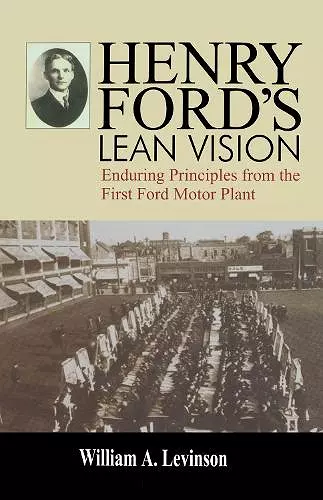Henry Ford's Lean Vision
Enduring Principles from the First Ford Motor Plant
Format:Hardback
Publisher:Taylor & Francis Inc
Published:10th Sep '02
Currently unavailable, and unfortunately no date known when it will be back

Praise from Industry Week, January 2003
"...In Henry Ford's Lean Vision...Levinson shows how the father of American mass production toiled to eliminate waste, instituted just-in-time delivery of inventory, and applied many other tools now identified with lean..."
Japanese manufacturers have made concepts like kaizen (continuous improvement), poka-yoke (error-proofing), and just-in-time famous. When the Japanese began to adopt these techniques from the Ford Motor Company during the early twentieth century, they knew exactly what they were getting: proven methods for mass-producing any product or delivering any service cheaply but well.
Henry Ford's methods, however, went well beyond the synergistic and mutually supporting techniques that constitute what we now call lean manufacturing. They included the "soft sciences," the organizational psychology that makes every employee a partner in the drive for success.
In Henry Ford's Lean Vision, William A. Levinson draws from Henry Ford's writings, the procedures in his factories, and historical anecdotes about the birth of lean in Japan to show that the philosophy that revolutionized Japanese manufacturing was the same philosophy that grew the Ford Motor Company into a global powerhouse -- and made the United States the wealthiest and most powerful nation on earth. Levinson reveals how Ford was ahead of other modern visionaries and discusses why the very ideas that made his company such a success were abandoned in his own country, and why they finally found acceptance in Japan.
Henry Ford's Lean Vision is a hands-on reference that provides the reader with proven principles and methods that can be applied in any business or service enterprise. It covers all aspects of building and running a successful enterprise, including Ford's principles for human relationships and the management of physical resources.
"Henry Ford's Lean Vision could have been written about the Theory of Constraints (TOC) as much as about Lean! To understand better TOC's concepts of Throughput World, satisfying all of the stakeholders, creating value, managing the supply chain and the constraint, the reader need only look into the fundamentals and principles of Henry Ford in Mr. Levinson's book. The book captures the idea that sustainable success must come from an integrated approach of leadership, methodology, culture and organizational alignment. Anyone who is trying to implement Theory of Constraints or Lean or other improvement methodologies should read and reread this book. Its historical analogies and numerous references to the more modern gurus make it an interesting and enjoyable read!"
Dee Jacob, Partner, The Goldratt Institute 06/01/04
ISBN: 9781563272608
Dimensions: unknown
Weight: 703g
400 pages